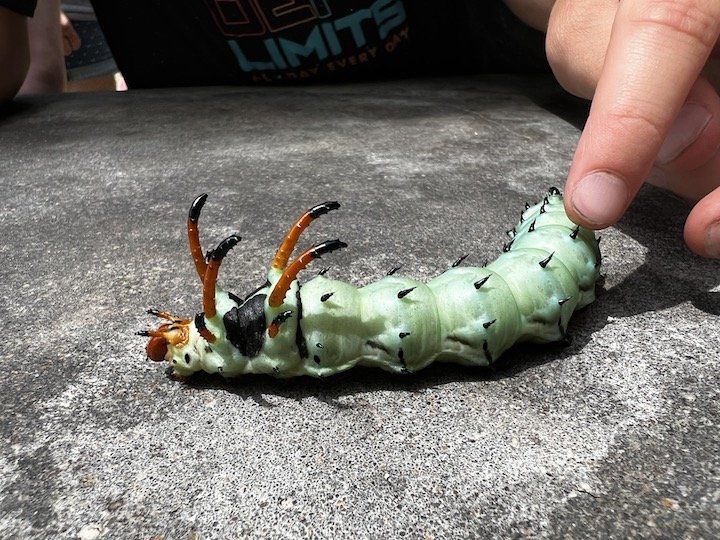This week we have an unusual offering; we have sweet corn you can swap into your share or purchase. But it is important that you read this next part so you’re fully informed. This is BT genetically modified sweet corn. That means that this corn has been genetically modified to be poisonous to corn earworms, using the genetics of the Bacillus thirengenis bacteria, which is naturally toxic to catapillars. We have never offered genetically modified produce before, and would not be doing it this year unless there were no other option. For better or worse, all the sweet corn we could locate this year is genetically modified, and both of our plantings have failed. We have not included any in the shares, because we want people to read and understand before they choose to purchase or swap for this corn, but I also want to be clear that I would never offer food that I thought was dangerous, or that I felt offered a hazard to the environment. So let me explain that a little bit. First, genetic modification is the process of taking the genes of one organism and inserting it into another organism. This has been done quite a bit in the last 40 years, and the most commonly used version of this is herbicide resistant crops, corn, soy beans, and cotton. There are two questions from my perspective about these crops; the first question is “are these crops a hazard to us based on their genetic modification?”, the second question is “are these crops hazard to the environment based on their genetic modification?” The current science seems to indicate that the primary hazard of genetically modified crops is a drastic increase in the use of herbicides. Herbicides used to be something that was used on the edge of the fields, and possibly before planting to establish a weed free seed bed. With genetically modified crops they are being used at something like 10 times the historic rate, because they are now used during the crop cycle over the top of crops. This use of herbicide over the top of crops intended for human food is the most obvious and eminent danger to human health connected to genetic modification of crops. To be clear, there is possibly some risk that the altared genes are unsafe in some as yet undiscovered way, but there is no evidence for that yet, while there is an abundance of evidence of the dangers of using herbicide on human food. As far as the second question, there is also a massive amount of evidence of the damage we are doing to our environment with our use of herbicides. They are directly poisonous to reptiles and amphibians and fish, and increasing evidence is showing that most of them also have carcinogenic properties to mammals as well.
However, sweet corn is a different storyline. Sweet corn has been modified using the Bacillus thuringiensis genes, which express the BT toxin which kills caterpillars. Bacillus thuringiensis is a organically allowed material that we apply to our brassica crops and lettuce crops to ward off caterpillars in those crops. We are using it because it’s naturally occurring, it affects only the target species, it is generally considered to be completely safe for humans and other animals, and it has a very short life in the environment. So this genetically modified sweet corn has that same ingredient, it’s not native to the corn genome, but it is a naturally occurring genetic component of the bacteria. The reason that it is very difficult to find non-genetic modified sweet corn anymore is because using the genetically modified sweet corn totally eliminates the need to spray. Any corn earworm that starts to eat the corn dies from BT poisoning. For a grower, this is an obvious win. They don’t have to spray, and they get a beautiful crop. This means that the vast majority of sweet corn grown is GM corn, including anything from the grocery store, unless it’s certified organic. Environmentally, studies have been done to try to determine the impact on other insect populations, and it appears that there is negligible impact because the only insects affected are caterpillars, and they have to directly consume the BT, which is only on the corn. All this to say, the bottom line is, I feel there is minimal risk to humans or the environment from BT sweetcorn, which is why I feel comfortable offering it to all of you who have trusted us to make good decisions about what food to offer you. This is corn my family eats, it’s delicious and nutritious, and it has likely never been sprayed with a pesticide. At the same time, I know there are many people with very strong feelings about any sort of genetic modification, and we would never put genetically modified crops directly into your CSA share because we don’t want anyone to unknowingly eat something they are uncomfortable with. So there you go, that is the relatively short version of what genetic modification is, and my personal perspective on it. So feel free to swap and buy sweet corn, or don’t, but I hope this helps you make a good decision for your family.
For more information, here are a couple of articles.
https://entomology.ca.uky.edu/ef130
https://www.livestrong.com/article/500667-bt-corn-advantages-disadvantages/
thanks,
Curtis




